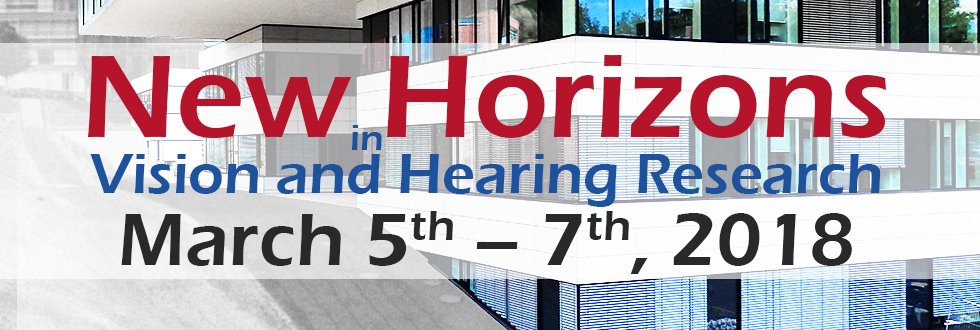The international symposium "New Horizons in Vision and Hearing Research 2018" - A great success!
The international symposium "New Horizons in Vision and Hearing Research" provided an intensive, interdisciplinary and internationally oriented scientific exchange on current developments in neurosensory research. The invited experts presented a huge variety of targeted therapeutic approaches and clearly demonstrated their implementation on the way from bench to bedside. A true hallmark on the way to further integrate hearing and seeing research.
Centre for Neurosensory Systems
The Centre for Neurosensory Systems was founded in 2011 as an institution of the Medical Faculty and the University Hospitals, Eberhard-Karls-University of Tübingen. With an emphasis on vision and hearing, the centre aims at investigating molecular physiological and pathophysiological processes of neurosensory systems. Based on an in-depth understanding of pathophysiological processes, new translational strategies for risk assessment, early diagnosis and prevention of neurosensory diseases are being developed.
The Centre for Neurosensory Systems is one of the institutions within the Neurosciences Campus, a core area of the Eberhard-Karls-University of Tübingen, comprising nine institutes in the area of computational neuroscience, integrative neuroscience, brain research and neurosensory research together with a large graduate program.
The Centre for Neurosensory Systems is constituted by:
- The University Eye Hospital,
Director: Prof. Dr. Karl-Ulrich Bartz-Schmidt - The Institute for Ophthalmic Research,
Director: Prof. Dr. Marius Ueffing - The University Department for Otolaryngology, Head and Neck Surgery,
Director: Prof. Dr. Hubert Löwenheim, - The Centre for Hearing Research,
Head: Prof. Dr. Marlies Knipper.
The Centre’s Board is made up of the four Heads of these institutions who elect the Centre’s Speaker for a term of four years. The present Speaker (second term) is Prof. Dr. Eberhart Zrenner, former Executive Director of the University Eye Hospital and founding Director of the Institute for Ophthalmic Research.
The Board defines the general strategy, the implementation of its aims in research and teaching and special patient care, organising its activities through its central office (Head: Dr. Thomas Wheeler-Schilling).
Presently, there are approximately 220 people working at the University Eye Hospital (76 beds, 6,100 in-patients, 47,600 out-patients p.a.) and approximately 110 working at the Institute for Ophthalmic Research.
At the Department of Otolaryngology (64 beds, 5,400 in-patients, 41,000 out-patients p.a.) 220 people and at the Centre for Hearing Research 25 full-time plus 40 half-time researchers and technicians are employed.
There are special out-patient clinics for patients with multiple sensory disorders who are cared for by an interdisciplinary team and there are several interdisciplinary Special Interest Research Groups in special research areas with regular meetings.
More than 200 participants attended this extraordinary symposium. More than 30% of the internationally renowned speakers come from outside Europe (USA, Australia and Canada), 50% from Europe (France, the United Kingdom, Switzerland, the Netherlands, Belgium) and around 20% from national institutions. The speakers (in alphabetical order) were: Brand, Michael; Cremers, Frans; Dalkara, Deniz; Dedek, Karin; Dollfus, Helene; Fauser, Sascha; Geleoc, Gwenaelle; Herrmann, Bjoern; Housley, Gary; Klaver, Caroline; Kollmeier, Birger; Lauer, Stefan; Lenarz, Thomas; Lentz, Jennifer; Leroy, Bart; Nagel-Wolfrum, Kerstin; Petit, Christine; Picaud, Serge; Polley, Daniel; Reisinger, Ellen; Roska, Botond, Sahel, Jose; Scholl, Hendrik; Senn, Pascale; Shepherd, Robert; Sieving, Paul; Smith, Richard; Strettoi, Enrica, van Dijk, Pim; Warren, Jason and many others.
During the symposium, a special emphasis was given to the numerous participation of doctoral students and postdoctoral staff from the Center for Neurosensory Systems and various Graduate Schools, many of which had successfully contributed to the flashlight presentations and the evening poster sessions. More than 52 posters in the thematic areas of gene expression, cell metabolism, neuronal connectivity, stem cells, experimental therapies, perception, imaging and image processing, physiological optics, pupil and prosthetics were presented. In the exchange with international leaders of the field, was a rewarding scientific experience of these graduates, postdocs and young group leaders. The whole event was an important, scientifically high-ranking contribution for the interdisciplinary neurosensory research area, both nationally and internationally.






























